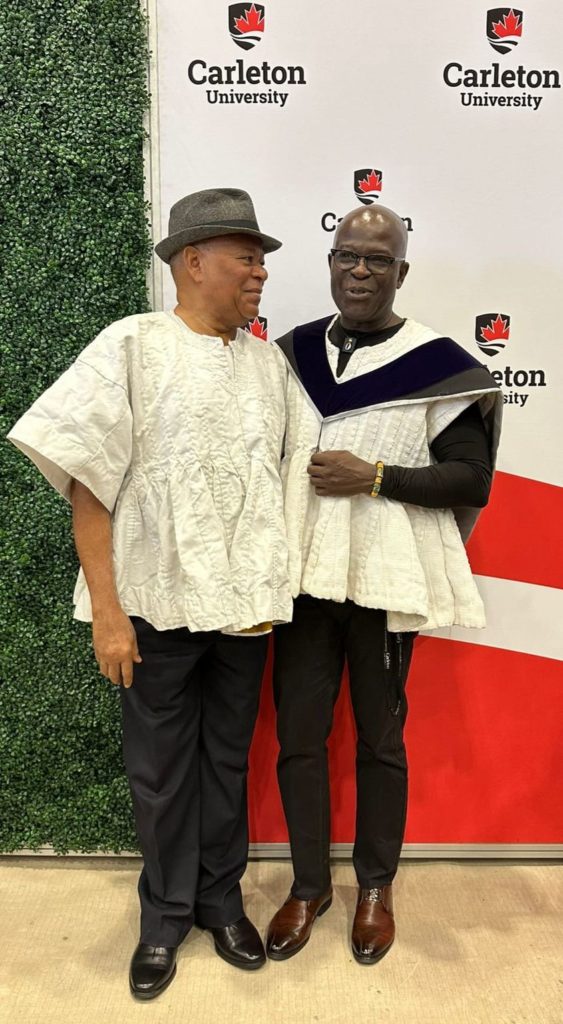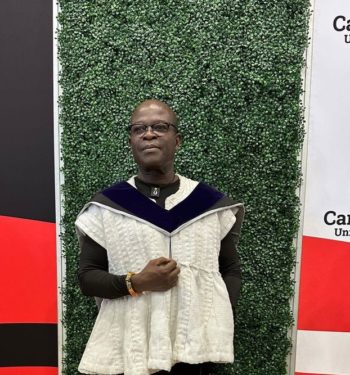
Saturday 4 November 2023
Carleton University’s adjunct professor, Dr. Andy Kusi-Appiah celebrated the award of a PhD. at the 160th convocation at Carleton University on Saturday 4 November 2023. Operating under the Department of Geography and Environmental Studies. The title of Andy’s thesis is: Political ecology of domestic water access and use in urban Malawi. A summary of this thesis is reproduced at the bottom of this page.
Apart from his academic position at Carleton University, Andy is a social justice advocate, a political commentator and a respected sports analyst. He is a regular contributor to Black Ottawa Scene.
Click on this link for articles on Black Ottawa Scene by Andy Kusi-Appiah:
Search Results for “Andy Kusi-appiah” – Black Ottawa Scene



Below is the abstract from Andy’s thesis:
Political ecology of domestic water access and use in urban Malawi.
Andy Kusi-Appiah, PhD
Rapid urbanization has worsened the water shortage problem in sub-Saharan African cities, with most people using water from sources other than official water supply systems. However, dominant accounts of why urban households face water shortages remain confined to the formal water sector, with explanations privileging market forces and institutional dynamics as significant barriers, with little or no attention to the role of non-market relations in mediating access to water among households on the periphery of municipal supply grids. Using Mzuzu (Malawi) as a case study, I applied theoretical perspectives grounded in political ecology and feminist political ecology to examine sociocultural and political strategies the poor mobilize to access water for daily use.
The findings indicate that the urban poor seek to address the problem of water shortage processually, assembling a set of contingent socio-spatial and temporal strategies that allow them to bridge between different spells and sources of water according to household utility purposes. For example, the study found that ganyu, an informal form of labour rooted in Malawi’s history, gives rise to usufruct access that allows the urban poor to obtain potable water from the homes of individuals who provide them with ganyu. At the same time, material control over water fosters indentured relations and confers upon individuals who provide ganyu enormous control over the productive labour of the women who seek and work ganyu to obtain water. As well, as providers of ganyu hold all the cards, they sometimes weave sexual demands into these contracts, at once locking poor women in a cycle of labour exploitation and sexual servitude. The findings defy conventional wisdom of water as simply a market commodity and show that in urban Malawi water represents a mechanism for the generation and exercise of social power, a force for material reproduction for the well-off, and an instrument for further subordination of women.
The study also reveals that the poor negotiate competing water needs by relying on symbolic meanings and cosmological and cultural beliefs to make sense of water and justify the domestic use of water from otherwise potentially contaminated sources. These findings also show the intimate connection and multiscalar integration between the water supply system’s formal, impersonal, market realm and the informal, interpersonal non-market social relations of water. The findings can potentially make significant theoretical and empirical contributions to our understanding of the sociocultural and political forces that shape access to water among the urban poor. The thesis concludes with recommendations and directions for future research.

